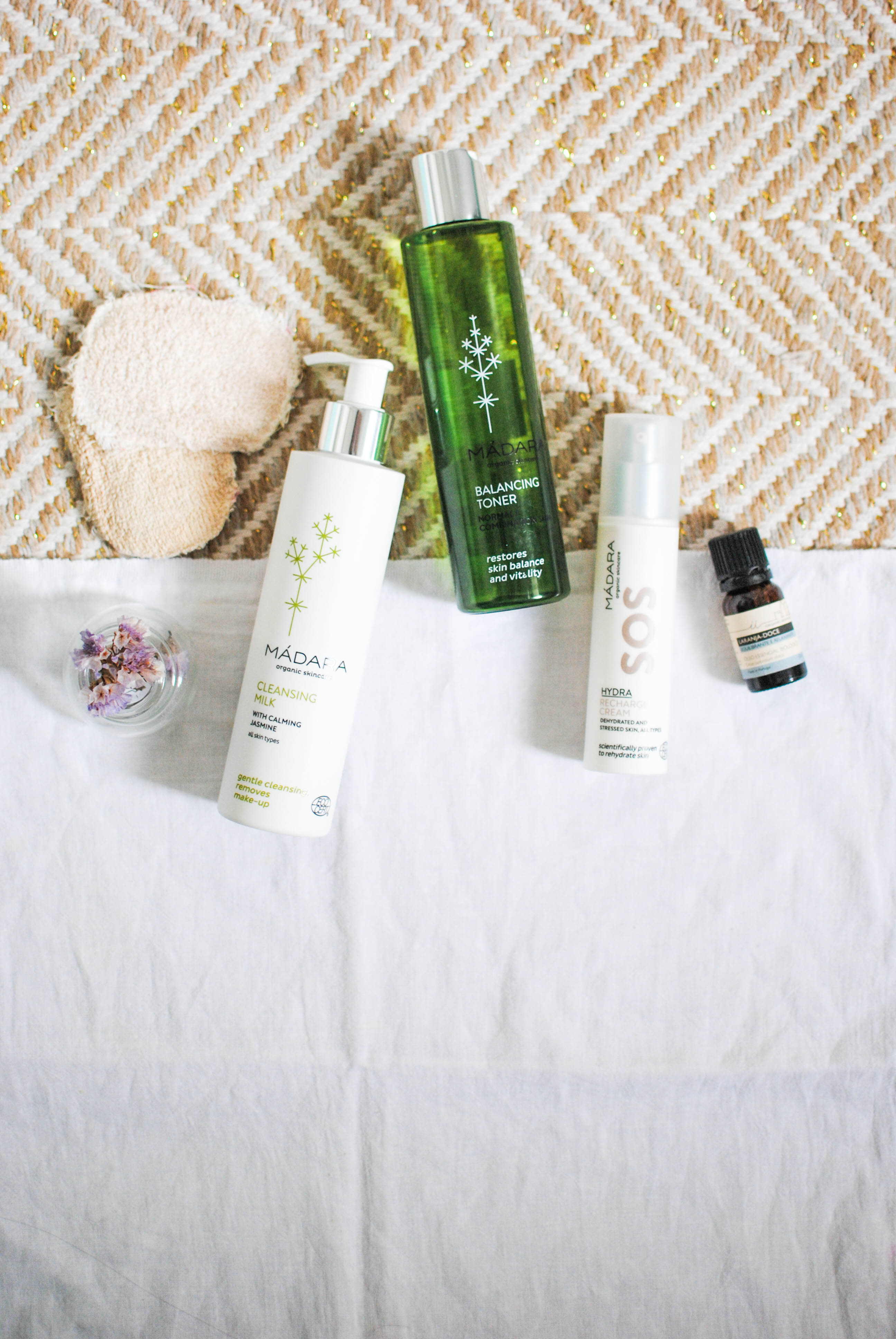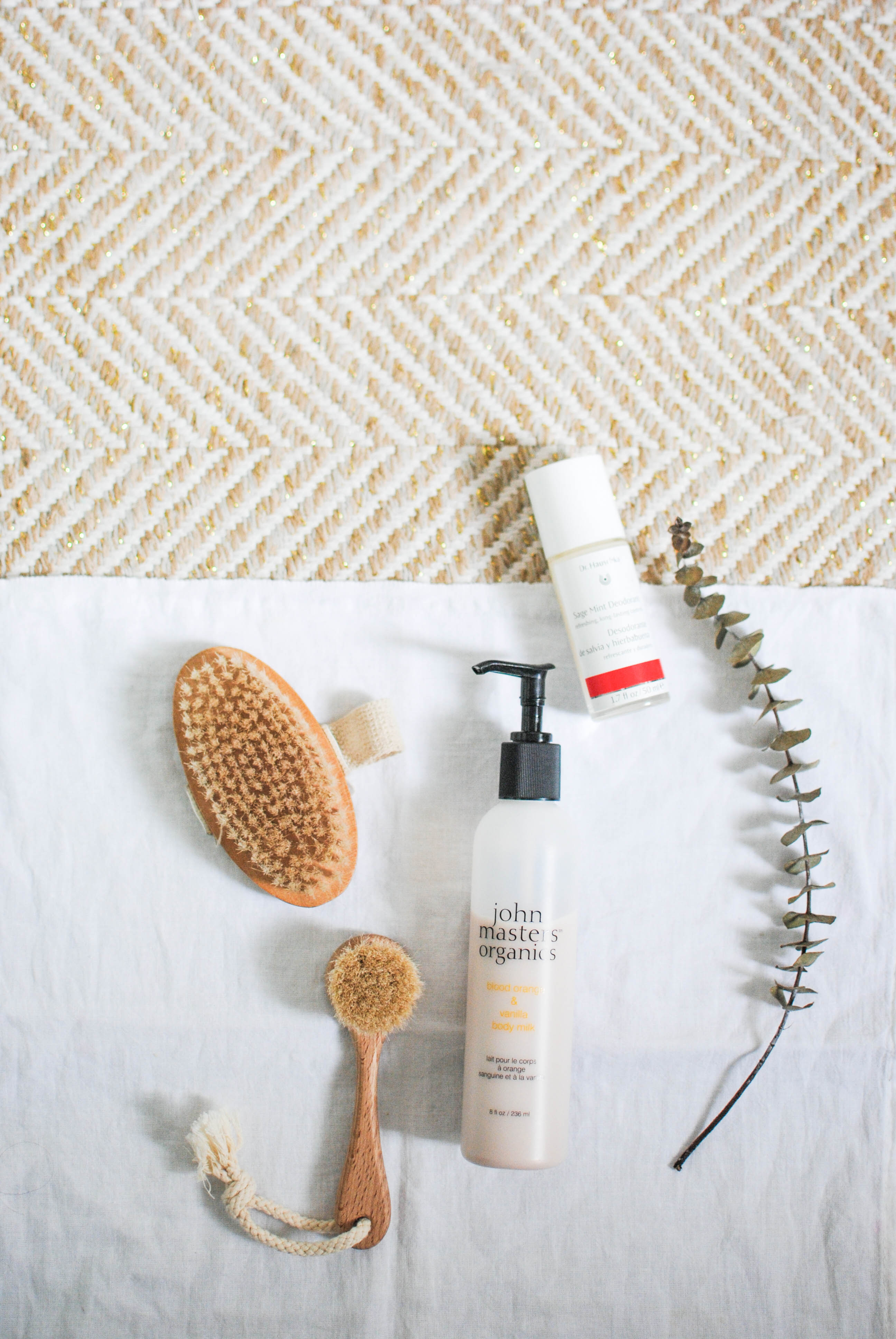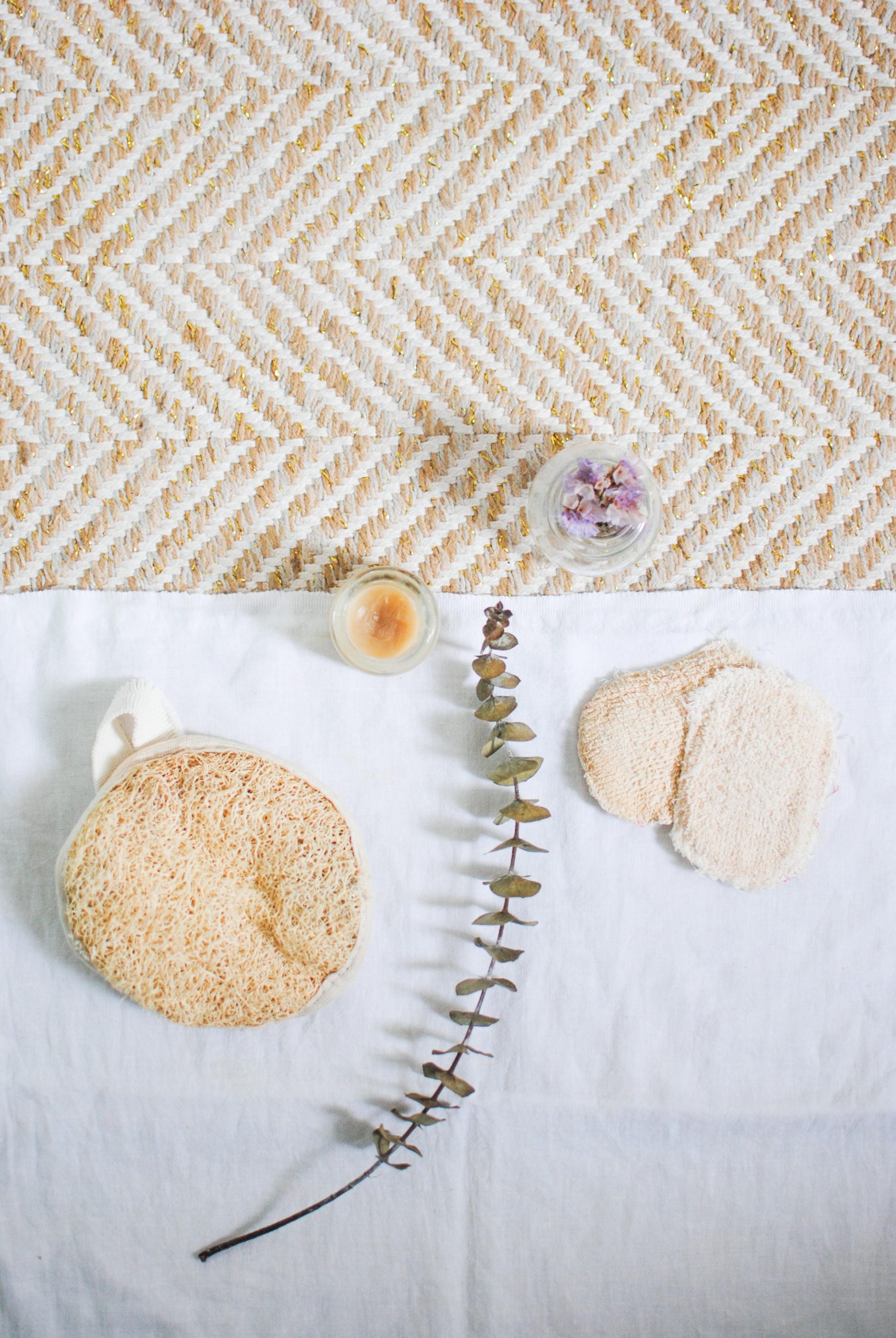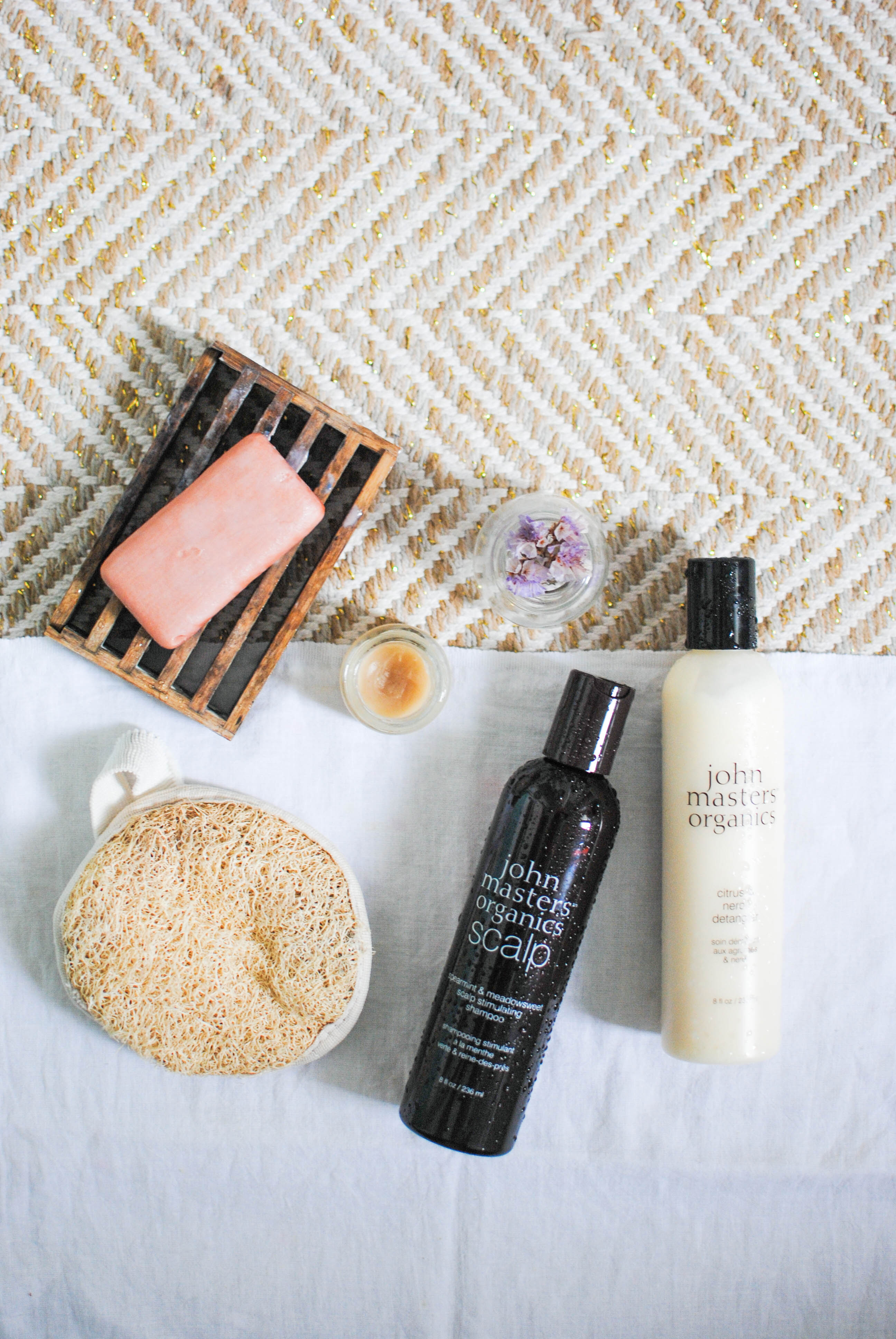The trend is here. Natural this, organic that, homemade products and wholesome ingredients. But why? Deep down, does it make sense? Should I give it a try? My answer is… YES!
Personally, I started using a more natural range of beauty products around 4 years ago. Back then, I dragged my mom to the only organic cosmetic shop I knew, Organii, and we asked for help on what should we buy, which brands, why, shampoos, moisturizers… We got a whole lecture on which ingredients to avoid and a series of good-for-you-and-the-planet options to choose from.
I started slow and, in all honesty, only this year I got completely rid of conventional cosmetics – the last one was a waterproof mascara that I couldn’t live without, but now I can! – and I’m now using exclusively organic products. More, I use less products, with more quality and better ingredients lists, made ethically and sold by a family business company. This makes my skin happier, the planet happier, the workers happier.
A year ago, I started to work more closely with Organii, an organic cosmetic shop that I admire ever since I got to know it. I’ve been loving my products and we embarked on a partnership together that I am now proud to share with you guys. Yuhuu! From now on, I will be sharing a few products and showing you some of their new arrivals. I want you to be informed, get the latest news, and be able to choose organic because You know it is better.
To start this collaboration, I interviewed Cátia Curica, part of the sister-duo who rocks this company for 8 years now. I am excited for you to read her words on why going organic, which ingredients we should avoid, which products to stop using right now and, of course, why Organii. The online store ships worldwide so go and check it out, it’s free!
Below you will find my own personal Organii products, that I love, trust and use every single day. Stay tuned, cause next week I’ll be sharing a giveaway on Facebook. Follow Please Consider on facebook here!

1. Cátia, what are the main differences between organic and conventional products?
Cátia Curica – Organic cosmetics currently comprise a vast array of brands and personal care products produced based on organic ingredients grown without pesticides and herbicides, from which purer and more active extracts can be extracted. Trademarks and manufacturers who develop these products seriously seek to make the manufacturing process as natural and with the least possible environmental impact without the use of genetically modified ingredients, fragrances, preservatives and synthetic colorants, or potentially hazardous chemical additives for our health and/or the environment. The reduction of the chemical intervention allows to highlight the authenticity of each ingredient contributing to a more complete and, above all, more effective final product.
In organic cosmetics:
– 100% pure and cold pressured vegetable oils, essential oils and active ingredients (plant extracts) from organic or wild farming are used;
– Emulsifiers and surfactants of 100% vegetable origin are used;
– No animal testing;
– Packaging of products, carton and paints are ecological;
– The products are 100% free from synthetic ingredients such as preservatives, colorants, fragrances, Sodium Lauryl Sulfate and Sodium Laureth Sulfate (SLS and SLEs), parabens, silicones, paraffin, mineral oils and other petrochemical derivatives;
– Are certified as biological/organic by an independent organization;
– The manufacturing process is carried out in a more natural way and with the least possible environmental impact and with the use of renewable energies.
A Natural Cosmetic is any product that has a natural extract, regardless of its percentage, how it was extracted or the other ingredients that go with it – which are generally synthetic. In this way, natural cosmetics may contain more or less natural products within this same designation. In practice, a natural cosmetic is very similar to all types of conventional cosmetics that, although they have interesting active principles, especially in perfumery, contain several petroleum derivatives, silicones, preservatives, colorants and flavorings that only do us bad and the environment. They can do us harm because the synthetic chemicals and petroleum derivatives used in most cosmetics, when absorbed, are not recognized by our body. They are substances with chemical constitutions that our body treats as “strange.” The body will then try to eliminate them, overloading the organs that perform this function, as is the case of the liver or kidneys. However, scientific studies prove that many of these substances remain in the body, intoxicating it, causing chemical disturbances and mutagenic effects. They can harm the environment because these constituents are not biodegradable, remaining as pollutants of water and soil for many hundreds of years.
Organic cosmetics, on the other hand, defend the integrity and purity of the whole transformation process, from the raw material to the final formulation of the product; from the use of organic ingredients to the way the extracts are obtained (without chemical solvents), to the handling and conservation of the product. Further more, synthetic products aren’t allowed because they are considered to be harmful and they exclude a large part of the conventional synthetic formulation, such as parabens, phenoxyethanol, phthalates, sodium lauryl sulfate (among others in the same family), petroleum jelly and paraffin (petroleum products), dyes, perfumes, etc.
2. Which ingredients should we really avoid and why?
Parabens
They are known to irritate the skin and eyes. They cause contact allergies. Some parabens are suspected of causing carcinogenesis, according to studies showing the presence of parabens in breast tumors. The reproductive toxicity of parabens has already been demonstrated. Some examples of parabens to avoid: butylparaben, ethylparaben, isobutylparaben, methylparaben, propylparaben.
Paraffin, petroleum jelly or petrolatum
Mineral oil derived from petroleum, used to give structure and substance to the products because they have a very low cost. Difficult to absorb by the skin, it causes heat reactions and allergies. It is not biodegradable.
PEG (Glicois)
PEG (polyethylene glycol) is just one example among many other glycols. Glycols result from the reaction of water with ethylene oxide and depending on the chemical reaction the various types of glycols are formed. Polyethylene glycol is a synthetic polymer formed from ethylene glycol. Also called in its abbreviated form PEG. They increase the occurrence of acne and blackheads. They are toxic and decrease the natural defenses of the skin.
PEG-2 Dimeadowfoamamidoethylmonium methosulfate
Another derivative of Limnanthes alba seed oil. It is a static anti-hair conditioning and softening agent for hair.
PEG-6 Caprylic / Capric glycerides
These are caprylic glycerides from, for example, almonds and are used as solubilizers, blending the natural oils with the water-soluble parts of the shampoo.
PEG-8 Dimenthicone meadowfoamate
It is an ester with a fatty acid derived from Limnanthes alba seed oil. It is a softening and emollient agent of the hair.
PEG-120 Methyl glucose dioleate
PEG-120 are derived from glucose from cereals such as Canadian wheat or corn. They serve as thickeners, surfactants (for foaming) or even natural flavourings in the food industry.
Silicones
They are oils and waxes based on silicone, synthetic polymer with very variable consistency and properties. Some examples are: dimethicone, cetyl dimethicone copolyol, phenyl trimethicone, stearyl dimethicone. They are never natural and there are already some studies that relate their absorption with forms of cancer.
Sodium Lauryl Sulfate (Sodium Lauryl Sulfate) and derivatives
It is a chemical detergent. It is aggressive to the mucous membranes and responsible for several irritations and allergic reactions on the skin, eyes and mucous membranes. They also damage the eyes and teeth of children under 6 years of age. It helps to dry the hair and promotes various irritations on the skin.
3. How do you suggest making the “transition”? Which products to change first?
In my opinion, the transition is urgent and therefore I advise to be done immediately, once a product ends up replacing it with another product but this time organic. There are products that I would rather not use at all than using their conventional cosmetics equivalent and they are lipsticks because we eat the lead and other heavy metals contained in them and the sunscreens because, when not organic, they spoill in the sun and I doubt they will not be worse for my skin than just being in the sun without protector (but in the shade, with clothes, and at appropriate times). Plus, they seriously pollute the sea and kill many marine species every year.

4. Do the products have the same effectiveness? What to do if they’re less effective?
There are more effective products and less effective products, it’s all about expectations. Although, the most effective products are shampoos, creams, oils and serums. Over time, all people are unanimous: hair and skin look better, much more nourished and moisturized in depth, and the effects actually last in time.
The least effective products are deodorants, waterproof makeup and varnishes. They are undoubtedly much healthier and people notice it on both skin and nails, but the performance is not the same. With the deodorizers it is necessary to realize that they will not be antiperspirants but that they can deodorize our secretions. And we have to search and test until we find one that suits us. Sometimes we have to try several but I’ve never met anyone who could not find one suitable for themselves! Regarding the eyelash mascara and nail polishes, they have to be replaced a bit more often. Well worth the effort!
5. Why Organii?
For a question of trust. We are not a distant company, keeping our clients at a distance while only looking at profits; we are people who form a family-run business with its own core values and a well defined mission. We choose the best organic products in the world, be they cosmetics or baby related, for our dear Portuguese consumers.
This is what we use at our home and with our families. It is what we believe to be the best! And this, at a time when half the world is trying to deceive the other, is what gives confidence, what makes people trust us.
We want to be a great Organii family because we believe that we are building a better world!
Thank you Cátia for sharing your wisdom with us. It will be a pleasure to collaborate in the future.
And you, I hope you liked the interview and can now (please!) consider a more natural way to take care of yourself.
Stay tuned!

